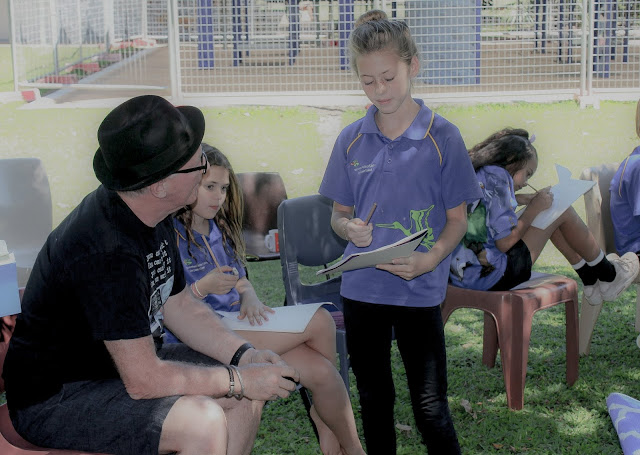It's an enduring question for young writers -where do you get your ideas? they ask.
Often believing there is something mystical to this aspect of the writing process. It's a secret they want you to share...
The truth is, ideas are everywhere.
Always an interesting conversation to have with young writers where we discuss where ideas are to be found. The broad horizons of choice that actually exist quickly become apparent. It challenges the somewhat narrow concept of 'ideas.'
The challenge for all of us who choose to write is to grow as explorers of the world. We must aim is to develop a broader view of the extensive possibilities at our disposal. That way we can eradicate that tired old catch-cry- I can’t think of anything to write about...’
As a teacher/writer I aim to share the broad influences on my own writing. It is important to dispel the myth that writing only equates to stories. What are the territories you explore to excavate ideas?
Ideas bubble up to the surface for one reason or another – full of possibility, and they buzz around us every day. They are hiding in broad daylight.
The difficulty is not so much in finding ideas as in deciding which ones are most worthy of our time and effort. Sometimes as writers we need to ruminate or take time to see them for what they are, rich, writing fodder. The capacity to find suitable writing ideas results from consistently looking for them. It's important to practice being a close observer of the world in which you find yourself.This way we learn to appreciate and harvest possibility.
In response to this provocation regarding where ideas are to be found, I wrote the following poem:
Hey Mr Poet
Hey, Mr. Poet
Why do you find ideas?
Where do they hide?
Hmmm…
Let me tell you curious child
Allow me to share
Ideas are lurking - EVERYWHERE!
You’ll find them in conversations
With friends
-Down on the corner
Around the next bend
You’ll see them for certain
Nestling in things
On rooftops, in clouds, and tangled up strings
They appear when you’re safe
In memories they bubble
They emerge from the shadows
Or when you’re in trouble
They wash all around us
They are there when we play
They float in the air
They surround every day
Find them in a rock, a stone
A tiny piece of gravel
Find them in the stories
We gather when we travel
They smoulder and flame
Fuelling inspiration
In your mind they burst to life
They spark imagination
Sit still, look around you
They’re coming your way
You will find them in books
And the words strangers say
They’re splashing in puddles
They’re hiding in boxes
In feathers, flamingos, funerals and foxes
They rest in your past
Like ghosts, they haunt your mind
Sometimes right in front of you
At other times behind
You find them in days ending in Y
Under your feet
High up in the sky
They dwell in our houses
In the branches of a tree
The pockets of trousers
And the buzz of a bee
They’re in incidents and accidents
Ants, -and snails and butterflies
Ideas hide in shadows
They leap out and surprise
Hear them in the rustling leaves
Sense them in a song
The carolling of magpies
In a kurrajong
Observe the world young writer
Remain forever curious
Idea are all around
And discovery is glorious




Discovery IS glorious! Thank you for this poem... you are so right about the task being which idea to focus on!
ReplyDeleteDiscovery is indeed glorious Irene, and we must hold onto that joy. Learning which idea is 'the one' remains an eternal challenge.
DeleteYour poem has me swirling with all the ideas out there in our wonderful world, or in my personal world, and as you & Irene both said, the challenge is the narrowing, the choosing. I liked seeing the pictures of you and students, Alan, and outdoors!
ReplyDeleteThanks Linda for your gracious observations. Glad you like the pictures with kids and the outdoors. Such a rich setting for ideas. When weather permits we should encourage writing in a variety of places around our school.
Delete"discovery is glorious" This poem is glorious. So full of wisdom and beauty. Thank you.
ReplyDeleteThank you Kimberly. Your feedback gives me reason to persist.
DeleteTHis poem made me smile--I especially love that you find them on days ending with Y--haha! Thanks for sharing. Becoming an explorer--that mindset leads to an overflow of ideas!
ReplyDeleteSmiles are good Laura. Becoming an explorer is essential to our writing mindset.
DeleteWhat a marvelous, traveling poem on idea finding–I do believe they are out there waiting to be hatched. And how true that we need to scrutinize about which poems we spend time on. Love the pics also Alan, thanks for all!
ReplyDeleteThank you Michelle for your kind words of response. So glad you liked the poem. It is the culmination of constant thought on this topic, curated across many years. I like the thought of ideas as hatchlings.
DeleteI love when poems have the time to "smoulder and flame" in my notebook, Alan. What a wonderful list poem of where we find inspiration. What a wonderful exercise, too, to note sources of inspiration. One never knows. Cheers! -- Christie @ https://wonderingandwondering.wordpress.com/
ReplyDeleteThank you Christie for your considered feedback. This poem brewed in my brain for many years. It has been a joy to finally put it out into the world.
Delete“They rest in the past like ghosts”...love.
ReplyDeleteThanks Jone. Always good when a line, a phrase, a word resonates with a reader. The aim always is to bring our very best words and squeeze them into those tight spaces synonymous with poetry.
Delete